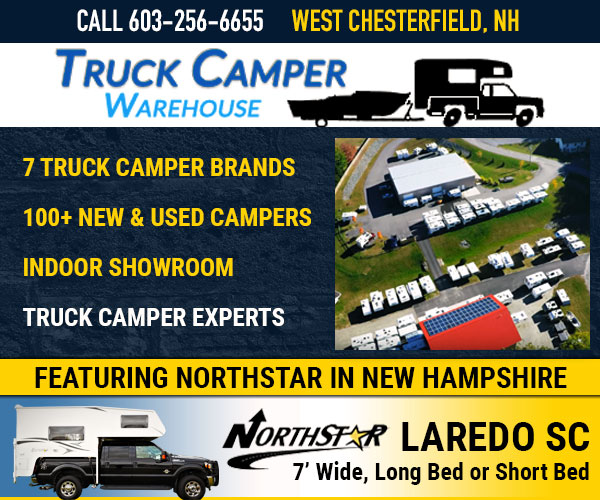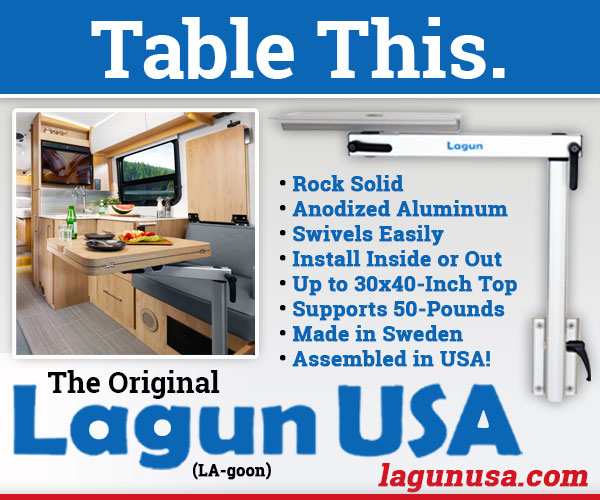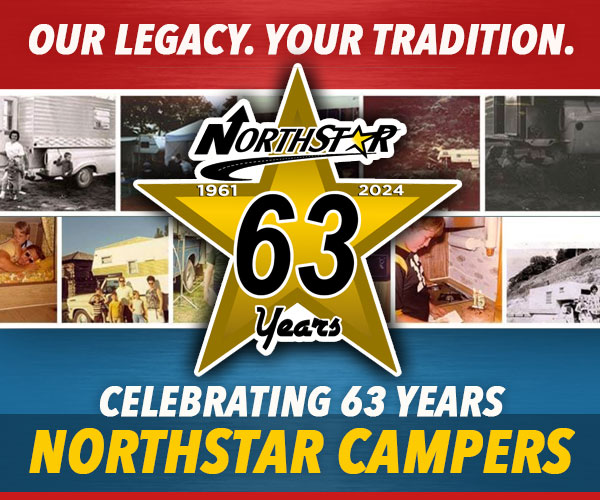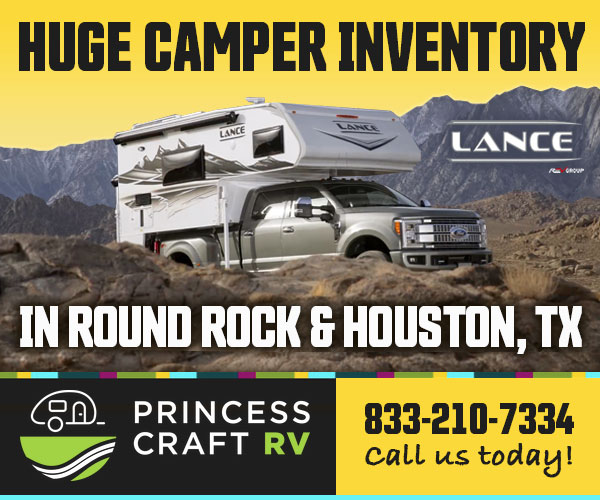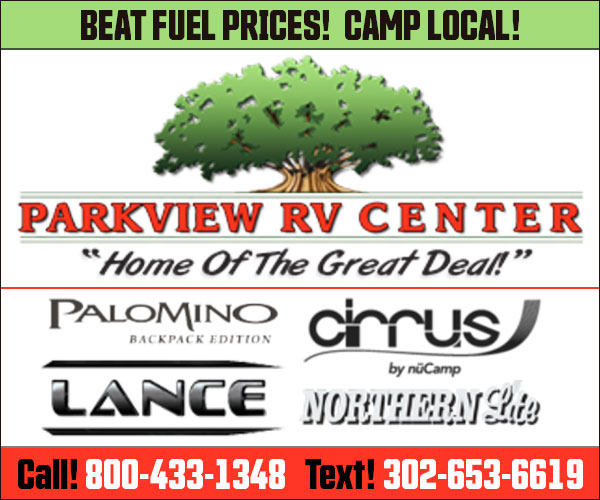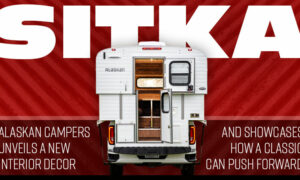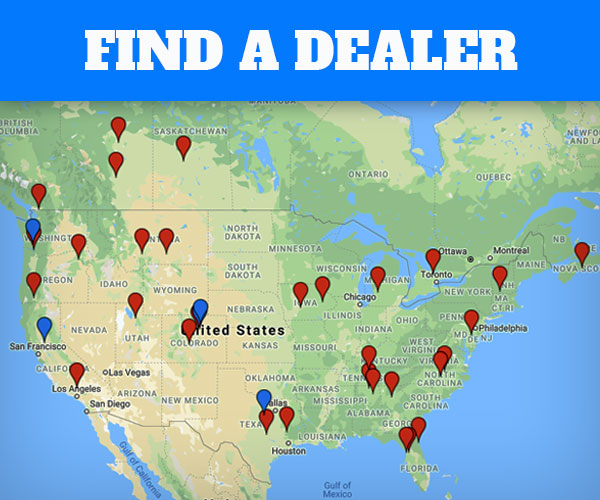With $6,000 in savings, MAK and Owen went on an after college road trip to see the USA. Six-months later the money ran dry and they returned to desk jobs and a house. That lifestyle ended on April 19th, 2016. Ever since they’ve been Bound for Nowhere.
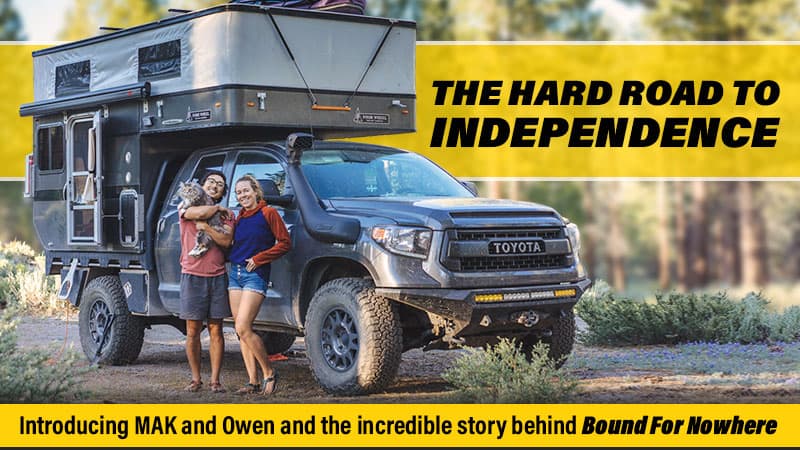
We are living in a time when people often live vicariously through the experiences of others via social media. One can follow youthful world travelers on Instagram, YouTube, and Facebook as they explore our planet and swing from adventure to adventure. The never-ending freedom on display is intoxicating; post after post, picture after picture, video after video.
In reality, life for these broadcast explorers isn’t nearly as perfect as the spectacular scroll-worthy spectacles they produce. Flat tires still happen. Family emergencies still happen. And yes, pandemics still happen. Life doesn’t stop just because you have thousands of fans, followers and likes.
The story of MAK (Mary Ashley Krogh) and Owen is a fascinating deep dive into this dichotomy. Since a momentous day in April of 2016, they have achieved a lifestyle of independence and endless movement all while making friends with fellow travelers from around the world. They also endured relentless vehicle breakdowns that drained their hard-earned bank accounts and threatened their wanderlust.
As we learned about MAK and Owen’s story, a larger message emerged; if there’s a lifestyle you truly want, be prepared to fight for it. Sometimes the universe conspires to stop us from our dreams. Those are the opportunities that reaffirm our convictions and we do what’s necessary to push forward. In the old days, they called that grit.
Let there be no doubt that MAK and Owen have a ton of grit. Multiple times we found ourselves asking, “Would we have given up and gone home if that happened?” Thankfully, they repeatedly recalibrated, rolled up their sleeves and found a way to persevere. There’s no quit in this remarkable couple. That’s how they became, and remain, Bound For Nowhere.
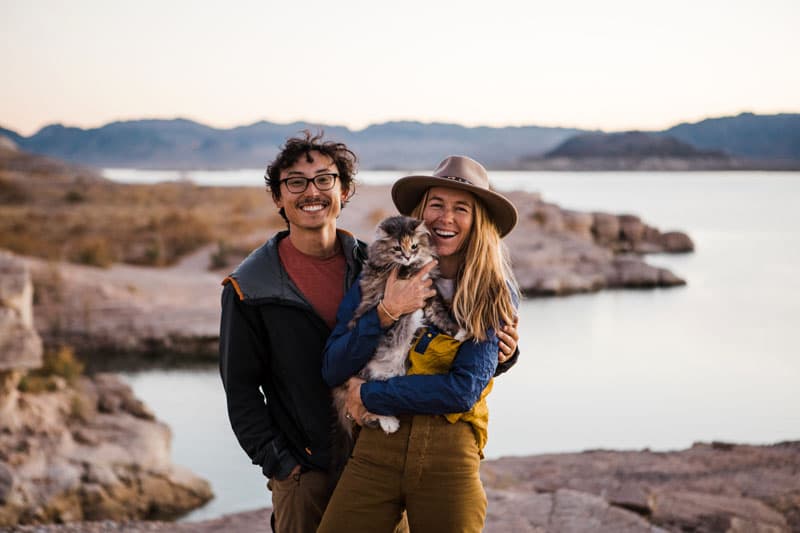
Why did you decide to go on the road full-time?
Our story starts quite a while ago. We hit the road for the first time three days after graduating college. The economy was in the tank, and Owen had a job he didn’t like. The odds were stacked against us as far as work.
Both of us were hungry for space and time to recalibrate. We decided to follow in our parent’s footsteps and take an extended road trip to see the country. Maybe we would start our lives somewhere else.
I was a military kid so my life experiences were mainly outside the continental United States. I am extremely patriotic, but I knew nothing about the USA. We wanted to get out, see our country, and shop for a new place to live.
The idea that we would get jobs on the road was pie in the sky. We had about $6,000 in our savings account and wanted to see how long we could go. This plan formed a couple of years before we graduated college, so we had saved up.
That first trip was in a Honda Element SUV and a hand-me-down tent. Ultimately, no one wanted to give art students jobs as we traveled. During that time we fell in love with the movement of being on the road but ran out of money.
After six months, we were in Estes Park, Colorado, and realized that we only had enough money to get back to Atlanta. So we threw our stuff in the Honda and drove back.
Two and a half years later we were freelancing on top of regular desk jobs. Owen said, “Why are we doing this?” We had just bought a house and ultimately ended up in life that we hadn’t envisioned. We were caught up in what we were supposed to be doing.
“We had just bought a house and ultimately ended up in life that we hadn’t envisioned. We were caught up in what we were supposed to be doing.”
That’s when we recalibrated and came up with a plan. The date of April 19, 2016, was put on our calendar. In another two and a half years we would quit our jobs, freelance for work, rent out our house, get a van, and get back on the road.
That’s what we did to the day and it’s one of my proudest accomplishments. It was driven by our hunger for movement. It was a quest for inspiration and a desire to access what we love to do. We are outdoors people.
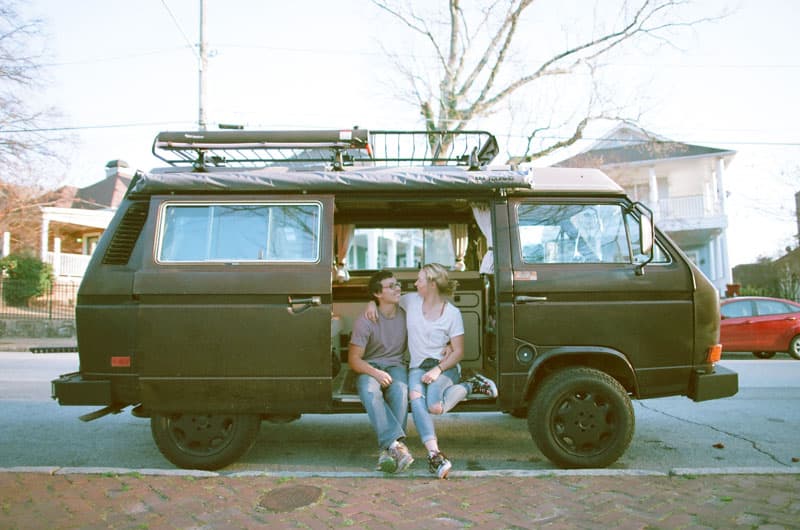
You had a couple of vehicles before you finally got a truck camper. What eventually led you to a truck camper?
We got started in a Volkswagen Vanagon and put a lot of money into it to make it reliable. We eventually put $30,000 into a $6,000 van. We were eating engines for breakfast and they were $7,000 apiece, not to mention a new transmission and radiator.
We had worked so hard to get on the road and we had saved money to weather the storm of not having work. In one month we blew through almost every dollar to keep that van running.
Our third new engine blew after 60 miles. We tried so hard to keep our VW running. It felt like our first home that we truly built together, so we had a lot of emotional attachment to it. Ultimately, we got fed up with expensive breakdowns and the lack of off-road capability.
At that point, we looked at our bank account and realized that we had worked too hard to let a vehicle hold us back. We had the fear that we wouldn’t have the money to eat or buy gas. It felt so devastating to work so hard and be at that spot. The van couldn’t be our downfall. So, we sold it. And that led to more lows.
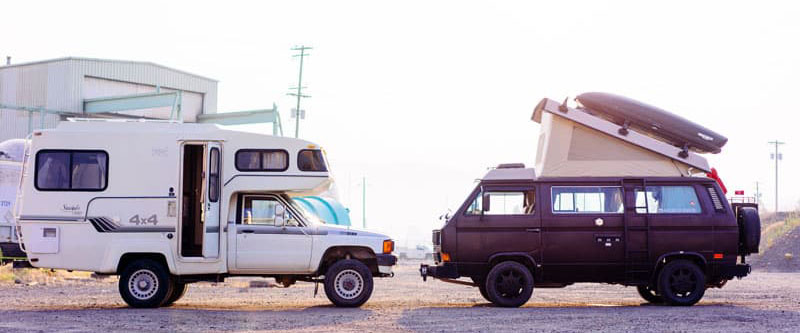
After that, we spent nine months building out a rare 1985 Toyota Sunrader (above left). After all that work, we realized that it wasn’t right for us, but we tried to make it work and set out to travel in it. Just a few miles down the road the wheel flew off and shot down the highway. After repeated issues to get it to work, we realized that our Plan B was also failing and that a pickup truck would be our most reliable solution.
Owen said, “I want a Tacoma”. He came from a Toyota family. We were in a Walmart parking lot having pizza when he said that. The next day, we bought one. We took the Sunrader back to Florida and sold it.
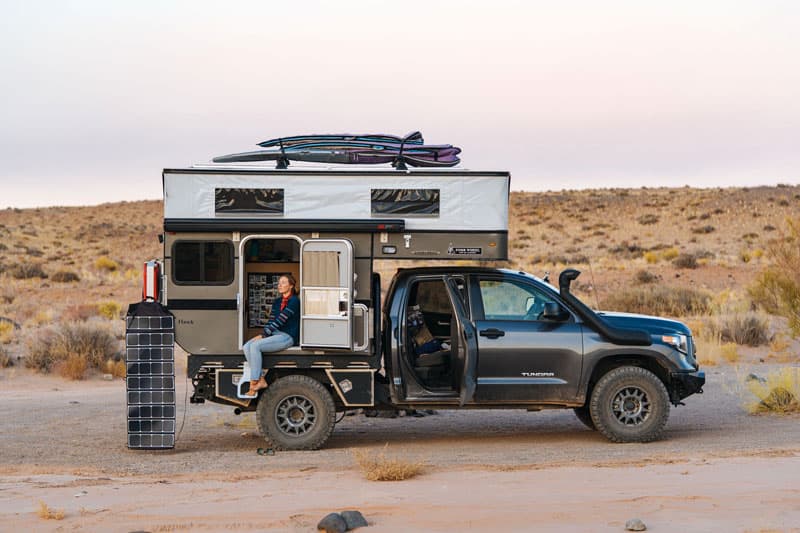
Is that when you got your truck camper?
That’s when we started looking at Four Wheel Campers. When building our current rig, a 2019 Toyota Tundra with a flatbed Four Wheel Camper Hawk, we wanted to solve all the issues we had in the past; reliability, comfort for work, good for all seasons, the ability to stand up, and off-road capabilities.
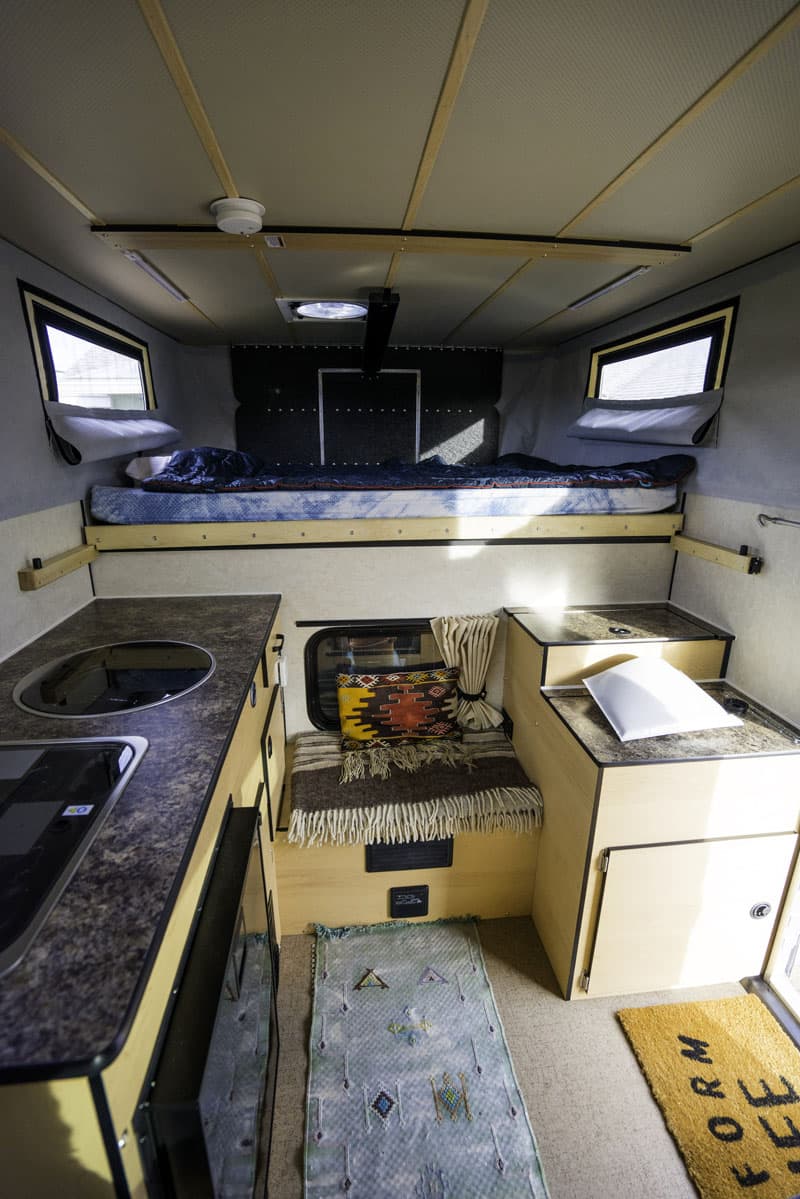
We call this truck our, “Slum Dog Millionaire” rig. Like in the movie, every aspect, option, and gear decision was based on an experience of what failed or went wrong in the past.
For instance, we have a winch because we’ve had to be winched out by too many people. We have an air compressor because we’ve had too many flats and have had to air down to overcome an obstacle in the road, but then had no way to air back up.
We went with the pop-top to keep our center of gravity low when we’re off-road and full standing height no matter the weather when we’re at camp.
“For us, the highs and the lows have been connected to each other. You have to have the lows to recognize the highs. And we’ve had many lows.”
We have had our fair share of good and bad experiences on the road. We like to say life on the road is full of high-highs and low-lows.
For us, the highs and the lows have been connected to each other. You have to have the lows to recognize the highs. And we’ve had many lows.
The high-high after the VW and Sunrader happened in Canada when we were parked in a semi-abandoned wharf in Nova Scotia. We opened up the tailgate as the tide came in the Bay of Fundy. The whales were breaching and moved in so close that we could feel their breath inside of us. It was so powerful to have them like 15-feet away. At that moment, I was so glad that we hadn’t given up.
We now have our Toyota Tundra and Four Wheel Camper and have been living on the road for four and a half years, but we didn’t move into our truck camper until about two and a half years ago. We live full-time on the road and work full-time from our camper.
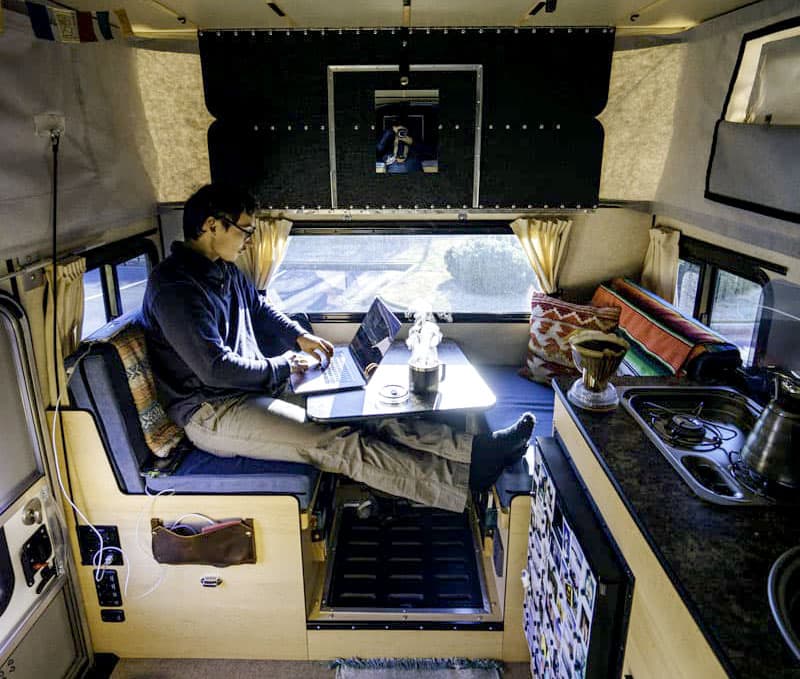
What do you do for work on the road?
I am a graphic designer and illustrator. Owen is motion graphics and graphic designer. We have a business together. We do freelance and teamwork. Owen transitioned to full freelance. It took me about two years to make the final jump to freelance.
Our business has changed and continues to grow. Graphic design and motion graphics is 50-percent and the other 50-percent are freelance photography, videography, influencer work, YouTube and our blog. We have been very lucky.
We have fun with our clients. We are open with them about how we live our day-to-day life, so they understand. It’s a strange conversation at first, but now they want to be a part of our journey.
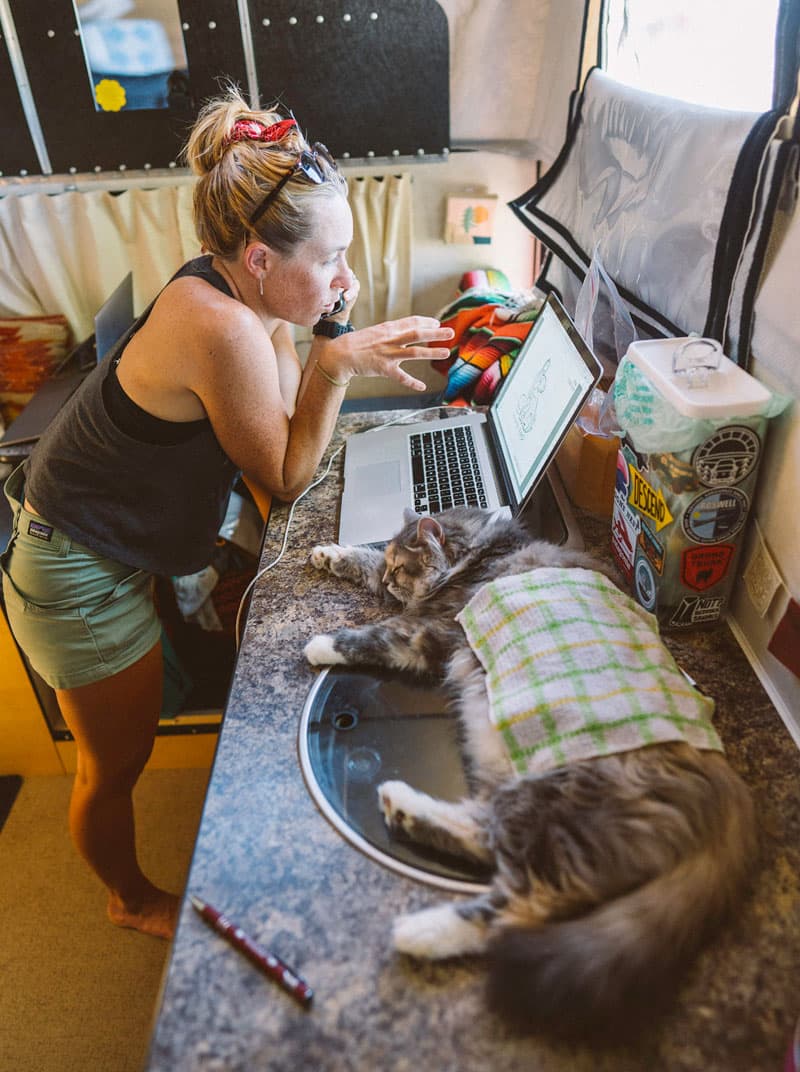
When we finally left our jobs in Atlanta we were fastidious about how we built our business. We wanted to make sure it worked. We knew what it was like to come off the road against our will. This time we made sure that we did things right.
When we went full-time we had enough clients to provide full-time work for us. We don’t have 40 hour work weeks, but the work we have is sustaining our lifestyle. Living on the road our costs are lower. Our client work has kept us going with comfort.
Since being on the road, our business has grown 100-percent because of word of mouth. People want to work with us and have had a good experience.
It sounds like things were going very well. What happened when Covid hit?
At the beginning of the pandemic, we lost our upcoming work, which was terrifying. Now work has returned and things are getting better.
Covid has made our social circle tighter and smaller. This past year has been with three other couples, and those are the only people we’ve been in contact with; Chase and Aimee, Karissa and Linhbergh, and Peter and Shruthi.
A year ago we hadn’t met any of them. We had all been internet friends and were fans of each other. We met shortly before Covid, so our bond has been fast. It’s like we’ve known each other our entire lives.
Back in March of 2020, we had only known Karissa and Linhbergh from a single meeting. We met up with them and went into the backcountry. After a week, we came out of the backcountry and found out that the world had changed. We hung out for a day and a week. That is when California announced that it was closing down at midnight. Owen and I didn’t know what to do.
“California announced that it was closing down at midnight. Owen and I didn’t know what to do.”
The grocery stores had no food and the water was shut down in the park. We may have been independent as RVers, but the harsh reality was that we were dependent on others.
Without even consulting each other, Karissa and Linhbergh offered their good size backyard to us. My family and Owen’s family are in Florida. The cases were not good there. Our goal was to make it to Alaska last year and we didn’t know how long the pandemic would last.
We decided to follow Karissa and Linhbergh back to California. We were in their backyard for almost three months. Luckily, the people we had chosen to be with put the same level of seriousness into the coronavirus as we have.
In June, we decided to leave the backyard and travel together again on the road. We’ve been traveling like a family ever since. That is what our summer series on YouTube is all about.
We wanted to get back on the road, happy, healthy, and safe. To be safe, we pushed to be in further remote places where many times we were out of cell service. We wanted to keep moving and make something of the year without getting sick.
The way we have both operated is that we treat everyone like they have my grandparents at home. We have been super careful and do not want to cause anyone to get sick.
How did you plan to make life on the road work during Covid?
For the last three weeks in quarantine, we had a daily discussion about that topic. We had to figure out how to make it work and needed to do it the right way.
As full-time RVers, we lost a lot coming off the road. Our mental health was very important and we felt like caged animals. When we lost our lifestyle, it was challenging.
So, we made a plan to be super strict. For example, we have a process when we go to the grocery store, which is the same that we were doing at Karissa and Linhbergh’s home.
Through those discussions, we realized that there was no way to do it on our own. Our success was reliant on each other. Chase and Aimee are in a VW van with a five-gallon water tank and cooler. Some have better power setups and some have better food storage.
As a team, we could go out further for longer. If we were going to go out, we agreed to circulate in remote areas that took a long time to get into so that people would be away from us. For example, we backpacked into remote areas of Idaho.
The world has been in turmoil, which is emotionally frustrating. Everyone had their highs and lows at different times. We have been able to talk things through and pick each other up.
There’s been a lot of guilt with traveling, but we couldn’t go home because my parents take care of my elderly grandparents.
We did think about renting a place. In full transparency, we have a loan on our truck and a loan on our camper. Our rig is our only place to live. It was terrifying to realize that we had no other options.
Ultimately, traveling with our small group was a good decision. Owen and I met on a swim team and have lived in a team-like environment. With our group, we felt like a team again. It was profound and special, in a way that we may never have again.
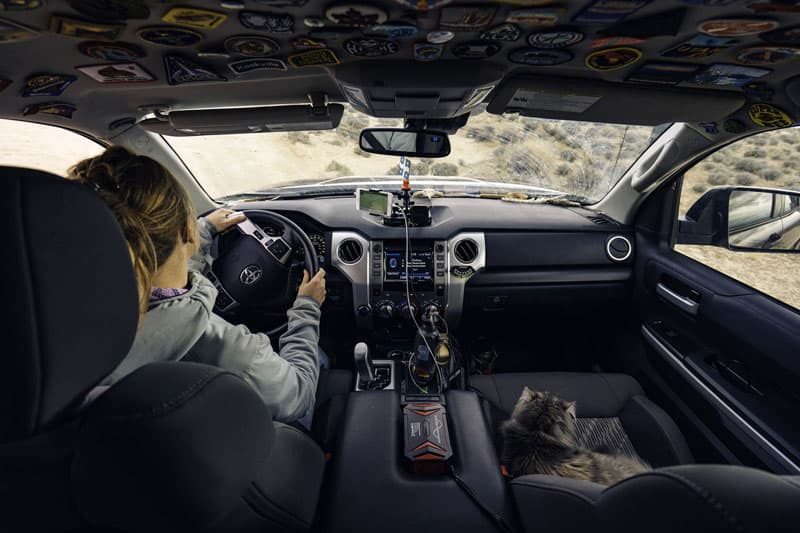
You were on the road long before Covid struck. Then you quarantined for three months and went back out. Did you notice any changes?
Yes, there are pretty significant changes. First, a lot more people are out there.
As influencers and bloggers, I feel like we’re in an interesting in-between world. We are passionate RVers encouraging people to go out and explore our country, but we have also seen the reality of the mistreatment of our land. It’s devastating.
Lots of people are discovering the outdoors for the first time. The resulting destruction has been gut-wrenching to see. There are places we went to right before the Covid shutdown that are now trashed. We visited a place in February of 2020 that was trashed by October.
“The resulting destruction has been gut-wrenching to see. There are places we went to right before the Covid shutdown that are now trashed. ”
I genuinely believe that this is happening because of the lack of education on how to properly camp, hike, and respect the land. These new RVers and travelers have not stayed on public land and do not see how fragile it is due to increased traffic. They also don’t seem to understand that they can’t poop on the surface of the land, leave toilet paper around (it’s not biodegradable), and leave trash behind.
It’s pretty frustrating to go back to a spot and see that. There’s a place in Sedona that we love to camp at. Luna, our cat, loved that wash. When we returned there, every morning she’d walk up and down the wash, and couldn’t go a few feet without sniffing toilet paper. There was none of that in February. We are seeing public access places that are being shut down because they are being mistreated.
People need to be aware as they press into remote places. If we continue to mistreat the land, it will be devastating.
The outdoor ethic of, “leave no trace” is not good enough anymore. It needs to be, “leave it better than you found it”. I can’t tell you the number of times I’ve been sobbing and picking up trash at the same time. Now we always have trash bags and gloves with us because we see this abuse at nearly every campsite we go to, even in the extremely remote areas.
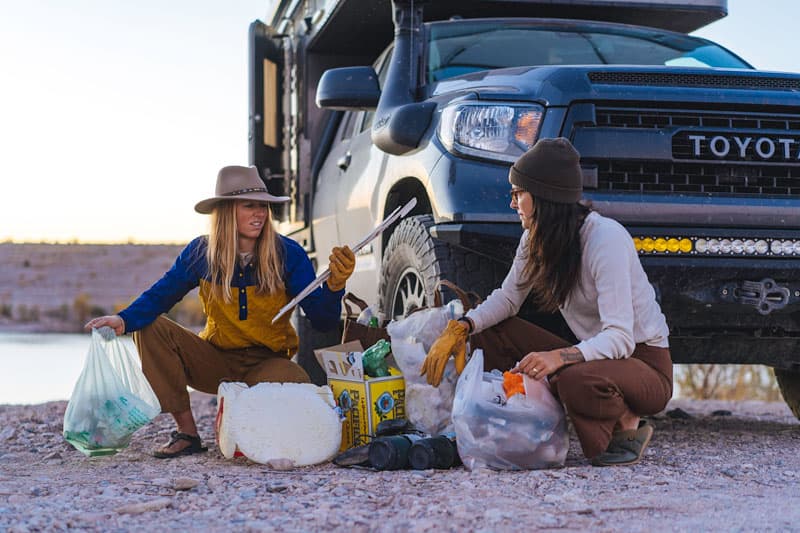
I am hoping the more people see and experience our national parks, state parks, BLM, and forest lands, the more they learn to respect what we have. People need to understand the importance of taking care of places like this.
Owen and I have decided that we can make a difference through our YouTube channel. I’ve approached our brand partners, like REI, about educational opportunities. People need to fall in love with the outdoors in order to save it.
I think what gets in our psyche is that we have seen places before and after. We know how they were so clean and nice. Others haven’t experienced that contrast.
Also, when someone goes to a place and it’s trashed, there’s more of a chance that it will get trashed more because it’s seen as not being taken care of. We have also seen public lands disrespected by visitors. It’s disheartening.
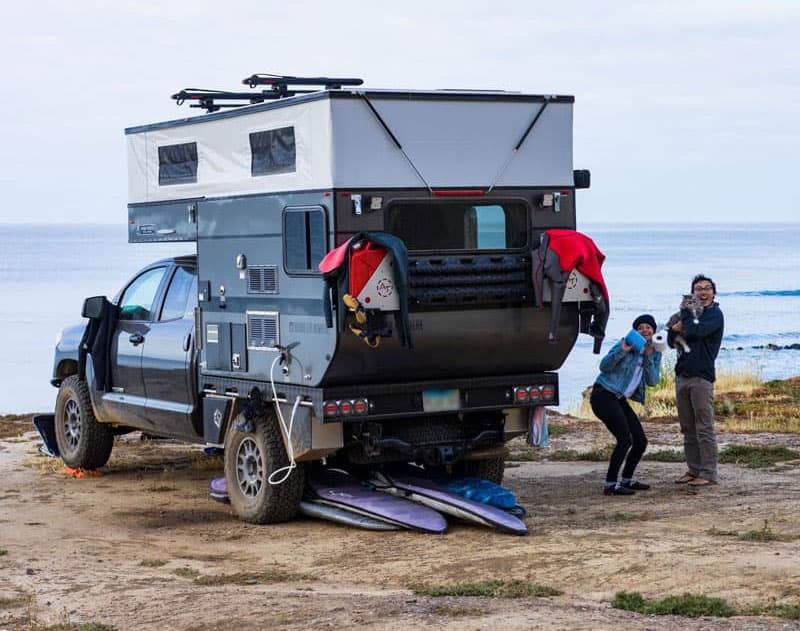
Tell us how you live full-time in a pop-up truck camper without a bathroom.
We have a Pot-T which is a piece of cardboard that can support weight and has biodegradable bags. We have maybe used it twice. Our ability to use the bathroom outside is part of our success in finding a good campsite. We carry a military-grade shovel and properly bury our waste.
We asked Four Wheel Campers to not give us a porta-potty. Instead, we used the porta-potty cabinet for Luna’s litter box. We need extra space for our recreational gear. We’d rather have that space for equipment than something we can easily do outside. We enjoy going to the bathroom outside.
Our camper has an indoor and outdoor shower. We typically only use the outdoor shower. The indoor shower has been used in the winter or when we get back late in the night after a backcountry expedition.
We are ex-swimmers, so we enjoy going swimming at recreation centers. During the pandemic, we have made appointments at rec centers when there are a few people in the building. Some are open just for travelers. Also, at this point, our bodies are used to not showering all that often.
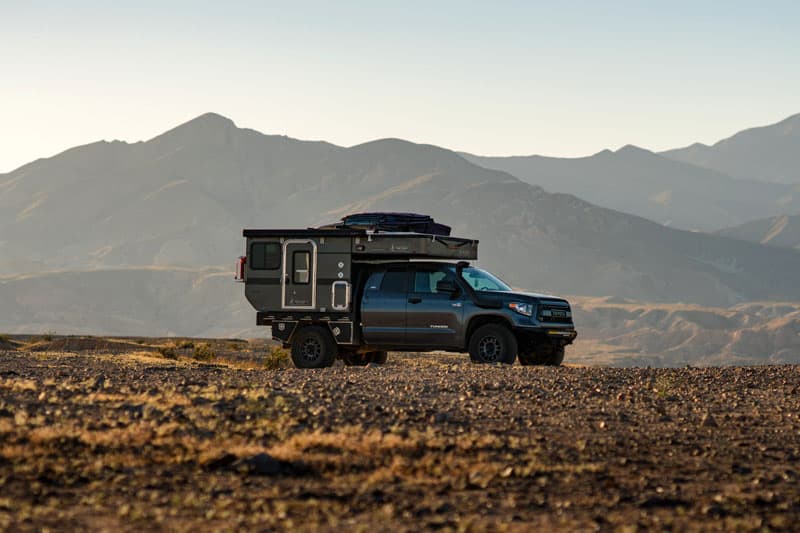
Have you had trouble during the pandemic filling your fresh water tank or getting propane and other needed supplies?
Coming out of the backcountry back in March, before we knew about how bad the pandemic was, we couldn’t get propane or water. We were in Page, Arizona, and we didn’t want to take their valuable resources when we have to the ability to get them elsewhere.
At first, we thought we would try to sit still and be ultraconservative with resources. That was until we realized we were losing access to the basics like propane, water, and groceries.
When we got back on the road in June, water and propane were easier to find. Plus, in the summer, our propane usage is minimal. In the summer, we can swim in bodies of water, so our need to shower was also minimal. We mainly got water and propane at gas stations.
How do you handle health insurance on the road?
Our health insurance is on healthcare.gov. Our business pays for it. We are an S-Corp so our business buys it.
Tell us about traveling with a cat in a pop-up camper.
We traveled with our cat, Luna, for 2-plus years before she passed a couple of months ago.
I’m so sorry to hear that. I know how extremely hard it is to lose a cat.
Luna was living with Owen’s parents in Florida when we started full-timing. We thought it would be for a year, and then we were out for two years. Every time we went back to Florida it was gut-wrenching. We felt guilty.
When we got the Toyota we thought she would do better because it was not loud, and we could control the temperature better with the truck and camper. So we said, “Let’s give it a shot”. We were going to figure it out. Plus, Luna wanted to be with us.
When we went back for the holidays, we took Luna out for drives and took her to a wildlife preserve. We had a leash and harness on her. She’s always been curious, so we felt like it was important to expose her to the outdoors.
Our strategy was that she would ride in the cab. Her kennel was there, so she had her safe spot. We seat-belted the kennel. Anytime we were driving or anytime we were in the camper we would be there with her. The only time she was alone was when we were on a hike or an overnight when we were backpacking. And that was only when we knew the weather would be good for her comfort.
The first couple weeks on the road we didn’t do much of anything. We were always with her, and we took baby steps. Slowly but surely she got comfortable. With us being in a truck camper, no matter where she was inside, she could see us or hear us. She loved to get outside. We only let her out when she wanted to go out.
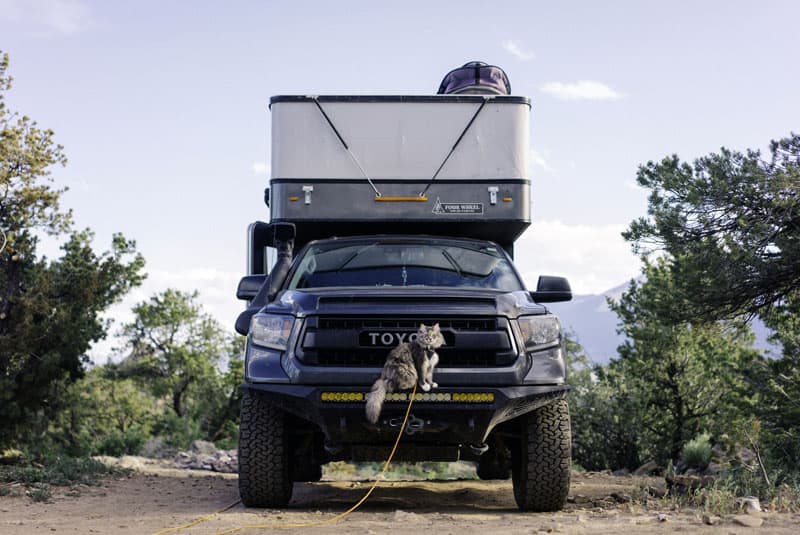
She used the leash and harness, but then it got to the point where she would not budge if we put them on. We were hesitant to take off the leash because we didn’t know if she would recognize and return to our truck and camper.
We were in California and had her on a 30-foot lead so that she could feel like she was on her own. She stepped in tree sap and backed out of the harness. Immediately, she ran right back to the truck and we were pretty far away from it.
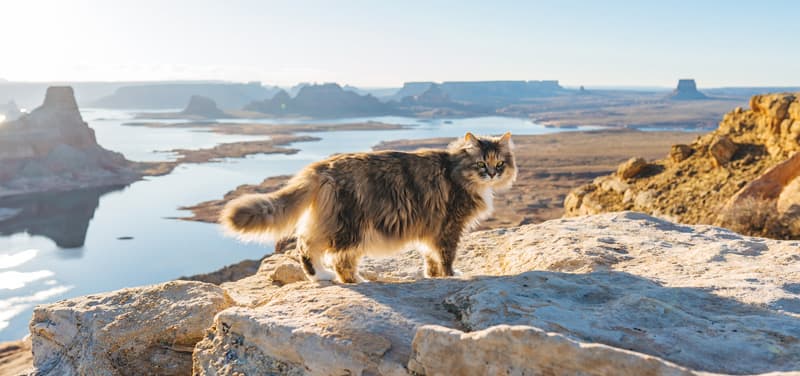
From then on, we knew she would go back to the truck. She only went outside when we were with her and we were always close by because of the wildlife. That slowly evolved to family walks together. She was good at going over cattle guards and navigating rocks. She even loved drinking from streams. She got sassy with snakes when she saw their tails move. Once we had to yank her away. She even started going outside to the bathroom.
We realize now she could have been with us this the whole time. That’s been a hard part of her passing. We promised her that we would take her to Alaska, so we’ll take her ashes with us there.
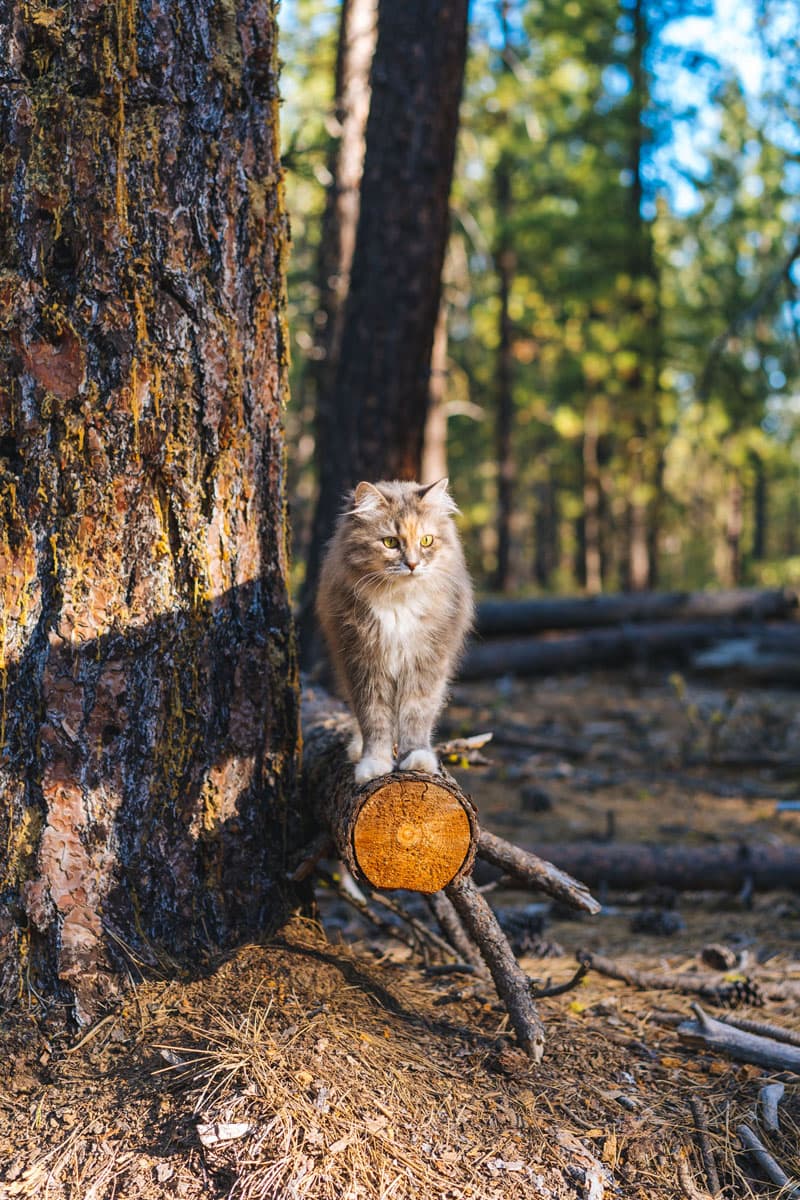
That’s a beautiful idea. How long do you see yourselves living on the road?
We just recently bought a house. It’s been a painful process. However, by no means are we coming off the road. We are hoping to become international travelers. We want to go to Japan, Australia, and New Zealand.
We have come to a realization during the past two years. Whenever we go back home to Florida for the holidays, it’s not rejuvenating and restful. We are trying to pack in too much.
We need our own place to recharge. We’re also starting to get larger projects that are better suited to a place with reliable power and internet. There have been numerous instances that it would have been nice to have a place for that. This house is both an investment in our future and supports our desire to be international.
In the short term, it will be a rental. In the longer term, it’s a place to come back to and recharge and rejuvenate.
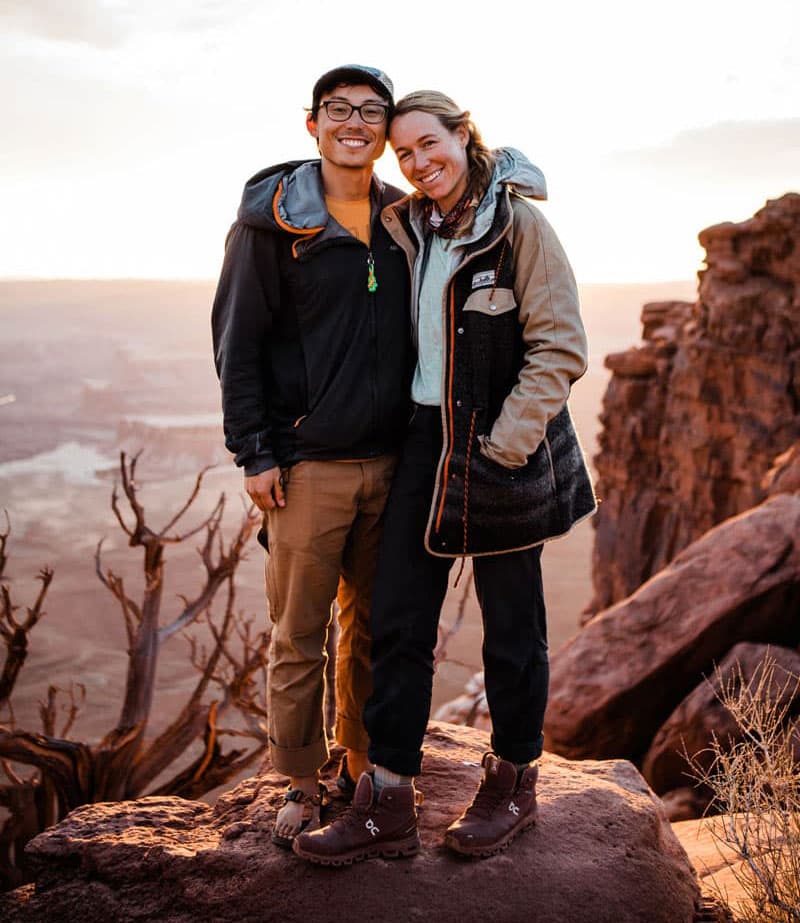
Is there anything else that you’d like to share?
We try to keep at the forefront, no matter what is going on, that we’re pursuing happiness. That is always our compass. I feel lucky to be married to someone who puts an emphasis on happiness.
We give ourselves the space and freedom to bring more happiness into our lives. Happiness is something worth pursuing and it guides us in making our big life decisions. We will do these things until the day they don’t make us happy anymore.
One reason I love our truck camper is that I love small spaces. Being in a small space breeds a tighter bond with your spouse and your pets.
Until we went full-time, I didn’t even know a bond that tight was possible. We are so close and in tune with each other. I attribute that to living in a small space together. The rewards for us are exponentially more.
I never want to live in a big space because I never want an excuse for my pets or spouse to be far away. We have created a space for each other.
We invite you to follow MAK and Owen, aka Bound for Nowhere, on YouTube and Instagram.
MAK and Owen’s Rig
Truck: 2019 Toyota Tundra
Camper: 2019 Four Wheel Camper Hawk flatbed
Tie-Downs and Turnbuckles: Norweld Flatbed Tray
Suspension: 2.5″ Main Line Overland GTS / Dobinsons Suspension System – Heavy Load SPC Upper Control Arms













